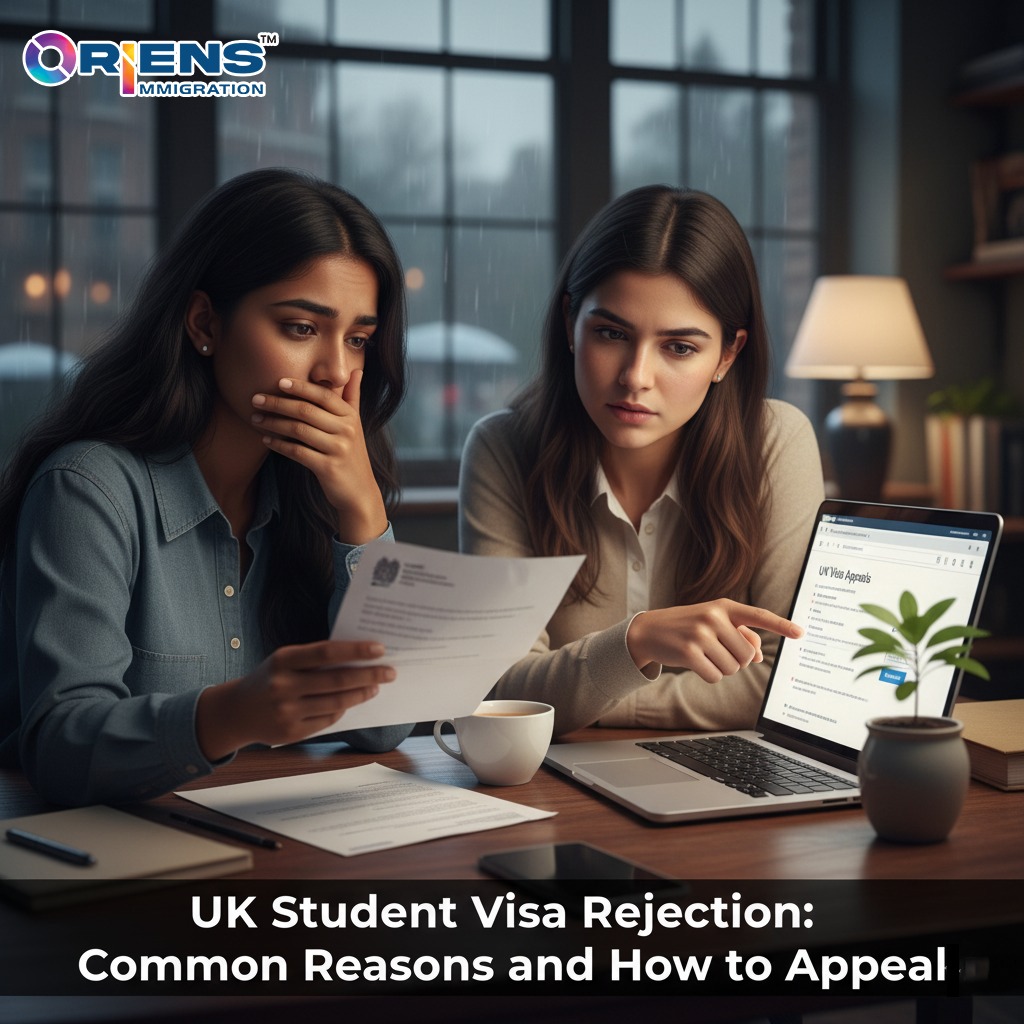













Many international students dream of studying in the United Kingdom, attracted by its world-class education system and global opportunities. However, obtaining a UK Study Visa can sometimes be challenging, and visa refusals are more common than many expect. A rejection can be discouraging, especially after investing effort, time, and finances into the application process. Understanding the main causes of refusal and the right way to appeal is crucial for turning a setback into success.
Common issues leading to UK student visa rejections include incomplete documentation, insufficient financial support, insufficient academic justification, or inconsistencies during the credibility interview.
At Oriens Immigration, our visa experts and immigration consultants help students conduct the complex visa process, ensuring they meet all requirements for a successful study abroad journey. In this guide, we’ll break down the key reasons for refusal, steps to appeal, and expert tips to strengthen their case and improve their chances of obtaining a UK student visa in the future.
One of the most frequent reasons for rejection is submitting incomplete or incorrect documents. The UK Home Office requires:
🔹A valid Confirmation of Acceptance for Studies (CAS) from a licensed institution
🔹Proof of sufficient financial funds (tuition fees + living costs)
🔹Passport and previous travel history
🔹English language proficiency test results (IELTS, TOEFL, etc.)
🔹Academic qualifications (transcripts, diplomas, etc.)
Solution: Double-check all documents before submission. Consult an immigration consultant to ensure accuracy.
You must demonstrate that you can cover tuition fees and living expenses (currently £1,334 per month for London, £1,023 outside London). Common mistakes include:
🔹Unverified bank statements
🔹Funds not maintained for 28 consecutive days
🔹Using an unapproved financial sponsor
Solution: Keep funds in an approved bank account for at least 28 days before applying.
Failing to meet the minimum required scores in IELTS, TOEFL, or other accepted English tests can result in a visa denial. Prepare thoroughly and submit valid, recent test results.
Most UK universities require:
🔹IELTS Academic: Minimum 6.0 (varies by course)
🔹TOEFL iBT: Minimum 72
🔹Other approved tests (PTE, Cambridge English)
Common Mistakes:
❌ Submitting expired test results (valid for 2 years only).
❌ Not meeting course-specific requirements (some degrees need IELTS 7.0+).
❌ Using non-approved tests (general IELTS instead of IELTS Academic).
Solution:
✔ Retake the test if your score is low or provide alternative proof of proficiency.
✔ Check university-specific requirements before applying.
✔ Consider pre-sessional English courses if borderline.
UKVI officers assess whether you are a genuine student or using the visa as a backdoor to work.
Red flags include:
🔹Choosing a course unrelated to your previous studies/work
🔹Weak Statement of Purpose (SOP)
🔹Inability to explain study plans during the interview
Solution: Draft a strong SOP explaining why you chose the course and how it aligns with your career abroad goals.
Your CAS is a critical document issued by your educational institution. Errors in the CAS number, expired references, or mismatched details can lead to immediate rejection. Always verify your CAS information and coordinate with your university or college to resolve any issues before submitting your application
If you cannot clearly explain your plans, your visa application may be denied if it appears you will not return to your home country after your studies.


A UK student visa rejection is disappointing, but it is not the end of your dream to study abroad. Here’s how you can respond:
1. Carefully Review the Refusal Letter
The refusal letter will explain the reasons for your rejection and outline the options available to you. Read it thoroughly to understand the specific issues with your application.
2. Administrative Review
If you believe the decision was based on a factual error, you can request an Administrative Review. This is suitable for most student visa cases. The review must be requested within 28 days if you applied outside the UK (or 14 days if inside the UK). The fee is £80, refundable if the decision is overturned.
Note: You generally cannot submit new documents unless requested.
3. Appeal to the First-tier Tribunal
If your refusal letter grants you the right to appeal—typically in cases involving human rights or discrimination—you can challenge the decision in court. Appeals must be filed within 28 days of receiving the decision. You can submit your appeal online, by post, or by fax, and provide supporting documents. The fee is £80 without a hearing or £140 with a hearing. Decisions are usually made within four weeks after the hearing.
4. Judicial Review
If you believe the refusal was illegal or the proper procedure was not followed, a Judicial Review might be suitable. This is a more complex legal procedure and often requires the help of visa experts or an immigration consultant. You must send a Pre-Action Protocol (PAP) letter to the Home Office before taking further action.
5. Re-Apply with a Stronger Application
You can always submit a new application. Address all issues in your refusal letter, provide better documentation, and consult immigration experts to improve your chances of approval.
Navigating the complexities of the UK student visa process can be daunting. Visa experts and immigration consultants bring in-depth knowledge, experience, and up-to-date insights to your application. They can help you:
🔹Identify and rectify weaknesses in your application.
🔹Prepare for interviews and documentation.
🔹Appeal rejections effectively.
🔹Increase your chances of a successful study visa outcome, enabling your career abroad and study abroad ambitions
Q1: What are the most common reasons for UK student visa rejection?
A: Insufficient financial evidence, lack of genuine intent, incorrect CAS, incomplete documentation, low English proficiency, and unclear career plans are among the most common reasons.
Q2: Can I appeal a UK student visa refusal?
A: Yes, if your refusal letter states you have the right to appeal, you can file an appeal with the First-tier Tribunal. Otherwise, you may request an Administrative Review or consider a Judicial Review in certain cases.
Q3: How long does the appeal process take?
A: After submitting your appeal, the tribunal usually issues a decision within four weeks of the hearing.
Q4: Can I reapply after a visa rejection?
A: Yes, you can reapply at any time. It’s crucial to address the reasons for your previous rejection and submit improved documentation.
Q5: Should I use an immigration consultant for my appeal or reapplication?
A: While not required, consulting with visa experts or immigration consultants can greatly enhance your chances of success, particularly if your case is complicated or you need assistance understanding the reasons for refusal.


Oriens is your one-stop solution for resolving all immigration-related queries and getting assistance with the procedure. Our consultants work towards ensuring that your journey of settling abroad does not involve any sort of hustle-bustle. Providing a host of solutions, we aim to take responsibility for all errands and requirements of your visa application process.
© 2025 All rights reserved